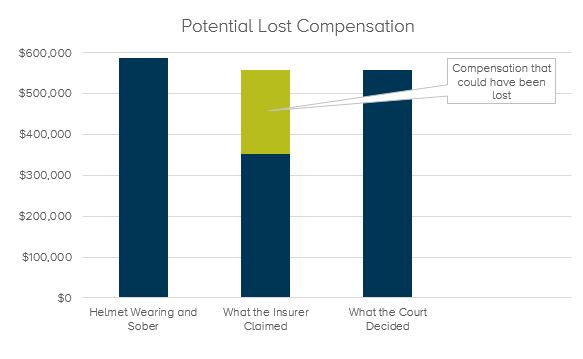
EMILY BILLIAU
Principal
If a driver intentionally hits or runs a cyclist off the road, they are liable for that cyclist's injuries.
And depending on circumstances of the accident, that might be irrespective of whether the cyclist is drunk, helmetless, riding two-abreast or riding out of the cycle lane.
We can all agree riding drunk and without a helmet is illegal.
But according to the courts (and we tend to agree with them), these actions won't always reduce your compensation, so long as they don't contribute to the accident.
Find out how the courts came to that conclusion (in Nominal Defendant v Rooskov [2012]) and what a cyclist's legal rights are when they are drunk and helmetless.
Nigel's Story
Let me introduce you to Nigel Rooskov.
Nigel was an active young man.
It was a Wednesday evening, and he had knocked off work early. He decided to join his workmates for a few drinks and a roast lunch at the bowls club not far from his home in Helensburgh, NSW.
He was about 6 schooners deep when he went to head home. It was about 3:30 pm.
Nigel was heading down Walker Street when he was clipped by a white car travelling at about 80km/hr.
Forced onto the shoulder, Nigel then hit a ditch and was catapulted from his bike.
He suffered extensive back injuries and lacerations to his face and upper body. He also suffered significant head injuries as he wasn’t wearing a helmet at the time of the accident.
Nigel was in and out of consciousness when the police and ambulance arrived.
He could recall that a car approached him, and he heard screeching like a car trying to brake but not much else. However, he didn't know the registration details of the vehicle that caused the accident or even its colour or type.
...And the car never stopped to see if Nigel was okay.
Nigel wanted to bring a claim against the driver who hit him.
But what happens when the at-fault driver isn’t known? How can you get the compensation you deserve?
A body exists under the Motor Accident Insurance Act called the Nominal Defendant. This body acts as a compulsory third party (CTP) insurer where a negligent driver's motor vehicle is unidentified and does not have CTP insurance.
In other words, where a car cannot be found or identified or does not have CTP insurance, a claim for compensation can be brought against the Nominal Defendant.

Emily Billiau
PRincipal
So that's what he did.
Nigel brought a claim against the Nominal Defendant.
But Nigel's claim wasn't as straightforward as he first thought. At trial, liability was in contention.
It would come as no surprise that the insurer believed that Nigel should be held somewhat responsible for the accident and his injuries, being that he was riding drunk and helmetless.
The insurer (aka Nominal Defendant) argued that Nigel was 40% to blame for the crash and his injuries. And as such Nigel's compensation should be reduced by 40%
The Court was forced to consider two critical issues:
The Issues
Alcohol
Nigel had consumed around 6 schooners of heavy beer before the crash.
An expert gave evidence at trial that his blood-alcohol level was likely in the range of 0.196 – 0.221g.
He went on to say that a person in that range was at least ten times more likely to suffer injury.
And while Nigel’s blood alcohol level was almost 4 times that of the legal limit, the Court believed that this didn’t contribute to the accident.
Why?

EMILY BILLIAU
Principal
“In Court, the burden of proving a cyclist contributed to their injuries is on the at-fault party.
Simply put, it was up to the insurer to prove that:
- 1Nigel’s drunkenness would have interfered with his judgement and
- 2that this caused his injuries.
While Nigel may have been able to speed up his reaction to hearing the approaching car, it wouldn’t have changed his course of action. He would still have been driven into the shoulder of the road and fallen from his bike.
In the end, the Court accepted that Nigel was intoxicated but agreed that:

Nigel wasn't penalised because he was riding drunk. Do you think that's fair? Have your say below.
Helmet
But just because it's a statistic, it doesn't mean that the law or the courts will agree.
The Court believed that not wearing a helmet:
- did not contribute much to Nigel's injuries; and
- the damage that resulted from this decision was only 'miniscule'.

Cyclists are required to wear helmets by law. Do you believe that Nigel should have been punished for doing something illegal? Have your say below.
Why?
If you consider how the Court's establish contributory negligence, the Nominal Defendant had to prove the decision not to wear a helmet would have caused the accident and increased his risk of injury. Again, the burden of proof is on the insurer.
It is true that not wearing a helmet increased Nigel’s risk of a head injury.
However, and this is important, had Nigel put a helmet on, it would not have changed the course of action or reduced the likelihood of his other significant injuries.
The car would have approached Nigel at speed, hit him and caused him to fall off his bike.
He would still have suffered significant bodily harm (like his back injury), and this would still have impacted his ability to work and live.
The Court mostly agreed with Nigel’s argument.
Ultimately, the Court did accept that Nigel decision to not wear a helmet meant he was guilty of contributing to his injuries. But they said that he was only 5% to blame, rather than the 40% the insurer claimed.
His compensation was reduced by 5% to $557,442.18.

What does this mean for cyclists?
While we would never condone riding intoxicated or without a helmet, this case does show that the Courts will protect cyclist’s rights first and foremost.
Drivers cannot shirk their duty of care by using a cyclist's actions against them... so long as those actions don't contribute to the accident.
The Courts will assess a situation on a case by case basis. They will look at the bigger picture.

Emily Billiau
PRincipal
If a cyclist’s wrongdoings did not contribute to the accident, then they should not be penalised for them.
Cyclists who suffer psych injuries from repetitive close passes would do well to understand the position that Courts will take to protect riders.

